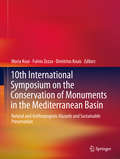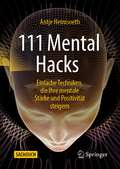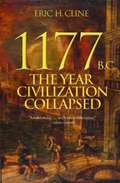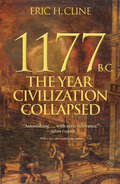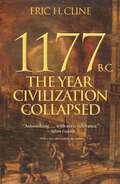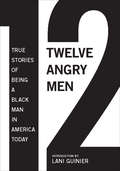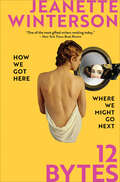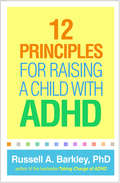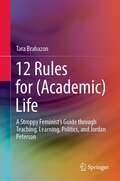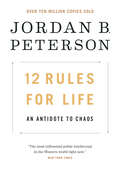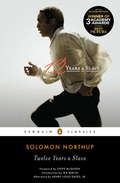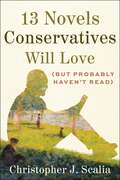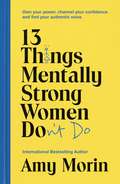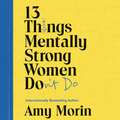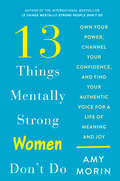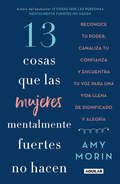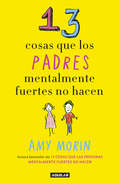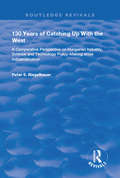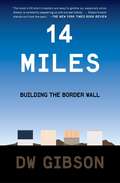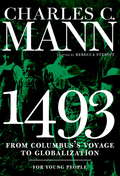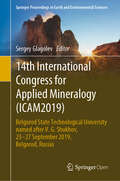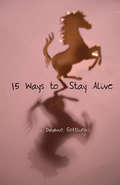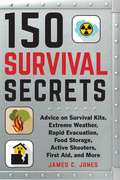- Table View
- List View
10th International Symposium on the Conservation of Monuments in the Mediterranean Basin: Natural and Anthropogenic Hazards and Sustainable Preservation
by Maria Koui Fulvio Zezza Dimitrios KouisThis book addresses physical, chemical, and biological methods for the preservation of ancient artifacts. Advanced materials are required to preserve the Mediterranean belt's historic, artistic and archaeological relics against weathering, pollution, natural risks and anthropogenic hazards. Based upon the 10th International Symposium on the Conservation of Monuments in the Mediterranean Basin, this book provides a forum for international engineers, architects, archaeologists, conservators, geologists, art historians and scientists in the fields of physics, chemistry and biology to discuss principles, methods, and solutions for the preservation of global historical artifacts.
111 Mental Hacks: Einfache Techniken, die Ihre mentale Stärke und Positivität steigern
by Antje HeimsoethDas menschliche Gehirn ist „plastisch“, d.h. es ist in der Lage sich zu verändern. Die Hirnforscher nennen dies Neuroplastizität, was bedeutet, dass Sie Ihr Gehirn buchstäblich neu verdrahten können. Warum nicht die Arbeitsweise Ihres Gehirns nutzen?Wir sind für unseren eigenen Erfolg verantwortlich. Die Einstellung macht´s. So können Sie mit mentaler Stärke Ihre Performance, Ihre mentale Gesundheit, Ihr Leben und vieles mehr verbessern. Dieses Buch mit vielen Grafiken und Abbildungen liefert dafür Erkenntnisse, Erfahrungen, effektive Techniken und einfach im Alltag anzuwendende Hacks.
1177 B.C.
by Eric H. ClineIn 1177 B.C., marauding groups known only as the "Sea Peoples" invaded Egypt. The pharaoh's army and navy managed to defeat them, but the victory so weakened Egypt that it soon slid into decline, as did most of the surrounding civilizations. After centuries of brilliance, the civilized world of the Bronze Age came to an abrupt and cataclysmic end. Kingdoms fell like dominoes over the course of just a few decades. No more Minoans or Mycenaeans. No more Trojans, Hittites, or Babylonians. The thriving economy and cultures of the late second millennium B.C., which had stretched from Greece to Egypt and Mesopotamia, suddenly ceased to exist, along with writing systems, technology, and monumental architecture. But the Sea Peoples alone could not have caused such widespread breakdown. How did it happen?In this major new account of the causes of this "First Dark Ages," Eric Cline tells the gripping story of how the end was brought about by multiple interconnected failures, ranging from invasion and revolt to earthquakes, drought, and the cutting of international trade routes. Bringing to life the vibrant multicultural world of these great civilizations, he draws a sweeping panorama of the empires and globalized peoples of the Late Bronze Age and shows that it was their very interdependence that hastened their dramatic collapse and ushered in a dark age that lasted centuries.A compelling combination of narrative and the latest scholarship, 1177 B.C. sheds new light on the complex ties that gave rise to, and ultimately destroyed, the flourishing civilizations of the Late Bronze Age--and that set the stage for the emergence of classical Greece.
1177 B.C.: The Year Civilization Collapsed (Turning Points in Ancient History)
by Eric H. ClineIn 1177 B.C., marauding groups known only as the "Sea Peoples" invaded Egypt. The pharaoh's army and navy managed to defeat them, but the victory so weakened Egypt that it soon slid into decline, as did most of the surrounding civilizations. After centuries of brilliance, the civilized world of the Bronze Age came to an abrupt and cataclysmic end. Kingdoms fell like dominoes over the course of just a few decades. No more Minoans or Mycenaeans. No more Trojans, Hittites, or Babylonians. The thriving economy and cultures of the late second millennium B.C., which had stretched from Greece to Egypt and Mesopotamia, suddenly ceased to exist, along with writing systems, technology, and monumental architecture. But the Sea Peoples alone could not have caused such widespread breakdown. How did it happen?In this major new account of the causes of this "First Dark Ages," Eric Cline tells the gripping story of how the end was brought about by multiple interconnected failures, ranging from invasion and revolt to earthquakes, drought, and the cutting of international trade routes. Bringing to life the vibrant multicultural world of these great civilizations, he draws a sweeping panorama of the empires and globalized peoples of the Late Bronze Age and shows that it was their very interdependence that hastened their dramatic collapse and ushered in a dark age that lasted centuries.A compelling combination of narrative and the latest scholarship, 1177 B.C. sheds new light on the complex ties that gave rise to, and ultimately destroyed, the flourishing civilizations of the Late Bronze Age--and that set the stage for the emergence of classical Greece.
1177 B.C.: The Year Civilization Collapsed: Revised and Updated (Turning Points in Ancient History #2)
by Eric H. ClineA bold reassessment of what caused the Late Bronze Age collapseIn 1177 B.C., marauding groups known only as the "Sea Peoples" invaded Egypt. The pharaoh's army and navy managed to defeat them, but the victory so weakened Egypt that it soon slid into decline, as did most of the surrounding civilizations. After centuries of brilliance, the civilized world of the Bronze Age came to an abrupt and cataclysmic end. Kingdoms fell like dominoes over the course of just a few decades. No more Minoans or Mycenaeans. No more Trojans, Hittites, or Babylonians. The thriving economy and cultures of the late second millennium B.C., which had stretched from Greece to Egypt and Mesopotamia, suddenly ceased to exist, along with writing systems, technology, and monumental architecture. But the Sea Peoples alone could not have caused such widespread breakdown. How did it happen?In this major new account of the causes of this "First Dark Ages," Eric Cline tells the gripping story of how the end was brought about by multiple interconnected failures, ranging from invasion and revolt to earthquakes, drought, and the cutting of international trade routes. Bringing to life the vibrant multicultural world of these great civilizations, he draws a sweeping panorama of the empires and globalized peoples of the Late Bronze Age and shows that it was their very interdependence that hastened their dramatic collapse and ushered in a dark age that lasted centuries.A compelling combination of narrative and the latest scholarship, 1177 B.C. sheds new light on the complex ties that gave rise to, and ultimately destroyed, the flourishing civilizations of the Late Bronze Age—and that set the stage for the emergence of classical Greece.
12 Angry Men: True Stories of Being a Black Man in America Today
by Gregory S. Parks Matthew W. HugheyWhen Harvard professor Henry Louis Gates was approached by the police on the front porch of his home in an affluent section of Cambridge, many people across the country reacted with surprise and disbelief. But many African American men from coast to coast were not surprised in the least. "Gatesgate" serves as the most recent manifestation of a phenomenon many black men experience regularly: being the subject of increased suspicion because of the color of their skin.In Twelve Angry Men, a dozen eloquent authors tell their own personal versions of this story. From a Harvard law school student tackled by security guard on the streets of Manhattan, a federal prosecutor detained while walking in his own neighborhood in Washington, DC, and a high school student in Colorado arrested for "loitering" in the subway station as he waits for the train home, to a bike rider in Austin, Texas, a professor at a big ten university in Iowa, and the head of the ACLU's racial profiling initiative (who was pursued by national guardsmen after arriving on the red-eye in Boston's Logan airport), here are true stories of law-abiding Americans who happen also to be black men.Cumulatively, the effect is staggering, and will open the eyes of anyone who thinks we live in a "post-racial" or "color-blind" America.
12 Bytes: How Ai Will Change The Way We Live And Love
by Jeanette Winterson&“Witty [and] provocative&” essays on how AI might change us by the New York Times–bestselling author of Why Be Happy When You Can Be Normal? (Kirkus Reviews). When we create non-biological life-forms, will we do so in our image? Or will we accept the once-in-a-species opportunity to remake ourselves in their image? What do love, caring, sex, and attachment look like when humans form connections with non-human helpers, teachers, sex-workers, and companions? And what will happen to our deep-rooted assumptions about gender? Will the physical body that is our home soon be enhanced by biological and neural implants, keeping us fitter, younger, and connected? Is it time to join Elon Musk and leave Planet Earth? In twelve eye-opening, mind-expanding, funny, and provocative essays on the implications of artificial intelligence that look to history, religion, myth, literature, politics, and computer science to help us understand, Jeanette Winterson tackles AI&’s most fascinating talking points, from the algorithms that data-dossier your whole life to the weirdness of backing up your brain. &“Thought-provoking and necessary—and sometimes very funny.&” —The Guardian &“Fascinating. . . . Winterson makes granular tech know-how remarkably accessible.&” —Publishers Weekly
12 Principles for Raising a Child with ADHD
by Russell A. BarkleyOver decades of research and work with thousands of families, Russell A. Barkley has become a leading authority on attention-deficit/hyperactivity disorder (ADHD) in kids and teens. He has learned what a huge difference parents can make in supporting their children's success--as well as how overwhelming it can be. This concise guide presents 12 key parenting principles for dealing with common behavioral, emotional, and school challenges. By cultivating a mindset of acceptance and compassion--together with an understanding of the executive function deficits of ADHD--you can strengthen your loving connection with your child and help your whole family thrive. Filled with practical suggestions and quick-reference lists and tips, this is the perfect book to read cover to cover or pick up any time you need extra support.
12 Rules for (Academic) Life: A Stroppy Feminist’s Guide through Teaching, Learning, Politics, and Jordan Peterson
by Tara BrabazonThese are strange times. Climate crises. Health crises. Collapsing systems. Influencers. And yes - Jordan Peterson.We are currently living in a (Post) Peterson Paradigm. This book – 12 Rules for (Academic) Life - explores what has happened to teaching, learning and politics through this odd and chaotic intervention. Deploying feminism, this lens and theory offers a glass-sharpened view of this moment in international higher education. It is organized through twelve mantras for higher education in this interregnum, and offers new, radical, edgy and passionate methodologies, epistemologies and ontologies for a University sector searching for a purpose. This is a feminist book which targets a feminist audience, both inside and outside higher education. It presents a clear focus on how this Peterson moment can be managed and challenged, when in future such academics deploy social media in this way. This book is also a part of higher education studies, exploring the role of the public / critical / dissenting / organic intellectual in debates about the political economy, identity/politics and leadership.A question of our time – through a climate emergency, a pandemic and polarized politics – is why Professor Jordan Peterson gained profile and notoriety. The Jordan Peterson moment commenced in September 2016 with his YouTube video, “Professor against political correctness,” and concluded with his debate with Slavoj Zizek on April 19, 2019. From this moment, his credibility was dented, if not destroyed.Jordan Peterson infused scholarly debates with Punch and Judy extremism and misunderstandings. Instead, this book offers research rather than certainty, interpretation rather than dogma, evidence rather than opinion, and theory rather than ‘moral truth.’ The goal is to recalibrate this (Post) Peterson Paradigm, to take stock of how this moment occurred, and how to create a revision of higher education.
12 Rules for Life: An Antidote to Chaos
by Jordan B. PetersonWhat does everyone in the modern world need to know? Renowned psychologist Jordan B. Peterson's answer to this most difficult of questions uniquely combines the hard-won truths of ancient tradition with the stunning revelations of cutting-edge scientific research.Humorous, surprising and informative, Dr. Peterson tells us why skateboarding boys and girls must be left alone, what terrible fate awaits those who criticize too easily, and why you should always pet a cat when you meet one on the street. What does the nervous system of the lowly lobster have to tell us about standing up straight (with our shoulders back) and about success in life? Why did ancient Egyptians worship the capacity to pay careful attention as the highest of gods? What dreadful paths do people tread when they become resentful, arrogant and vengeful? Dr. Peterson journeys broadly, discussing discipline, freedom, adventure and responsibility, distilling the world's wisdom into 12 practical and profound rules for life. 12 Rules for Life shatters the modern commonplaces of science, faith and human nature, while transforming and ennobling the mind and spirit of its readers.
12 Years a Slave
by Ira Berlin Henry Louis Gates Solomon Northup Steve McqueenThe official movie tie-in edition to the winner of the 2014 Academy Award for Best Picture, starring Chiwetel Ejiofor, Michael Fassbender, and Lupita Nyong'o, and directed by Steve McQueen New York Times bestseller "I could not believe that I had never heard of this book. It felt as important as Anne Frank's Diary, only published nearly a hundred years before. . . . The book blew [my] mind: the epic range, the details, the adventure, the horror, and the humanity. . . . I hope my film can play a part in drawing attention to this important book of courage. Solomon's bravery and life deserve nothing less." --Steve McQueen, director of 12 Years a Slave, from the Foreword Perhaps the best written of all the slave narratives, Twelve Years a Slave is a harrowing memoir about one of the darkest periods in American history. It recounts how Solomon Northup, born a free man in New York, was lured to Washington, D.C., in 1841 with the promise of fast money, then drugged and beaten and sold into slavery. He spent the next twelve years of his life in captivity on a Louisiana cotton plantation. After his rescue, Northup published this exceptionally vivid and detailed account of slave life. It became an immediate bestseller and today is recognized for its unusual insight and eloquence as one of the very few portraits of American slavery produced by someone as educated as Solomon Northup, or by someone with the dual perspective of having been both a free man and a slave.
13 Novels Conservatives Will Love (but Probably Haven't Read)
by Christopher J. ScaliaA discussion of 13 works of literary fiction in the context of their relevance to conservative beliefs. Great novels are a remarkable confluence of complex characters, powerful storytelling, and beautiful language. They ask important questions and explore major ideas that can reflect a culture—and shape it. Yet if you talk to right-of-center readers about literary fiction that considers ideas of particular interest to conservatives, they tend to mention the same handful of books. They neglect greatness from across the centuries—hardly a conservative thing to do! Christopher J. Scalia&’s 13 Novels Conservatives Will Love (but Probably Haven&’t Read) helps anyone interested in conservatism both restock their fiction shelves and better understand a great intellectual tradition. A former English professor and a widely published critic and opinion writer, Scalia discusses outstanding works of fiction by anglophone writers from Samuel Johnson to Zora Neale Hurston, Nathaniel Hawthorne to P. D. James, Willa Cather to Walter Scott. These novels explore topics like national identity, tradition, religion, human nature, and many more—without descending into simplistic propaganda. Scalia connects the themes of great works spanning four centuries to the insights of such thinkers as Edmund Burke, William F. Buckley, Roger Scruton, Michael Oakeshott, Gertrude Himmelfarb, and Russell Kirk. Engaging, insightful, and funny, 13 Novels Conservatives Will Love (but Probably Haven&’t Read) introduces readers to great literature and teaches them about principles central to conservativism.
13 Things Mentally Strong Women Don't Do: Own Your Power, Channel Your Confidence, and Find Your Authentic Voice
by Amy MorinThe emergence of the #MeToo and #TimesUp movements have awakened society and encouraged women to find their voice and claim back their power. Contending with a host of difficult issues that demand psychological strength - in this crucial book, prominent psychotherapist and licensed clinical social worker Amy Morin gives women the techniques to build mental muscle in 13 steps.Delving into critical issues like sexism, social media, social comparison, and social pressure, Amy offers thoughtful, intelligent advice, practical tips, and specific strategies; combining them with her personal experiences, stories from former patients, and both well-known and untold examples from women from across industries and pop culture. Throughout, she explores the areas women - and society at large - must focus on to become (and remain) mentally strong.Amy reveals that healthy, mentally tough women don't insist on perfection; they don't compare themselves to other people; they don't see vulnerability as a weakness; they don't let self-doubt stop them from reaching their goals. Insightful, grounded, and extremely timely, 13 THINGS MENTALLY STRONG WOMEN DON'T DO can help every woman flourish - and Amy will take readers on this journey with her, every step of the way.
13 Things Mentally Strong Women Don't Do: Own Your Power, Channel Your Confidence, and Find Your Authentic Voice
by Amy MorinThe emergence of the #MeToo and #TimesUp movements have awakened society and encouraged women to find their voice and claim back their power. Contending with a host of difficult issues that demand psychological strength - in this crucial book, international bestselling author, prominent psychotherapist and licensed clinical social worker Amy Morin gives women the techniques to build mental muscle in 13 steps.Delving into critical issues like sexism, social media, social comparison, and social pressure, Amy offers thoughtful, intelligent advice, practical tips, and specific strategies; combining them with her personal experiences, stories from former patients, and both well-known and untold examples from women from across industries and pop culture. Throughout, she explores the areas women - and society at large - must focus on to become (and remain) mentally strong.Amy reveals that healthy, mentally tough women don't insist on perfection; they don't compare themselves to other people; they don't see vulnerability as a weakness; they don't let self-doubt stop them from reaching their goals. Insightful, grounded, and extremely timely, 13 THINGS MENTALLY STRONG WOMEN DON'T DO can help every woman flourish - and Amy will take readers on this journey with her, every step of the way.(P)2019 Harper Audio
13 Things Mentally Strong Women Don't Do: Own Your Power, Channel Your Confidence, and Find Your Authentic Voice for a Life of Meaning and Joy
by Amy MorinIn the time of the #MeToo and #TimesUp movement, international bestselling author and leading global expert on mental strength Amy Morin turns her focus to feminism, explaining what it means—and what it takes—to be a mentally strong woman.The emergence of the #MeToo and #TimesUp movements have awakened society and encouraged women to find their voice and claim their power. But to do this, women must learn to improve their own mental strength. Contending with a host of difficult issues—from sexual assault on college campuses, to equal pay and pay gaps, to mastering different negotiation styles—demands psychological toughness. In this crucial book, prominent psychotherapist and licensed clinical social worker Amy Morin gives women the techniques to build mental muscle—and just as important, she teaches them what not to do. What does it mean to be a mentally strong woman? Delving into critical issues like sexism, social media, social comparison, and social pressure, Amy addresses this question and offers thoughtful, intelligent advice, practical tips, and specific strategies and combines them with personal experiences, stories from former patients, and both well-known and untold examples from women from across industries and pop culture. Throughout, she explores the areas women—and society at large—must focus on to become (and remain) mentally strong. Amy reveals that healthy, mentally tough women don’t insist on perfection; they don’t compare themselves to other people; they don’t see vulnerability as a weakness; they don’t let self-doubt stop them from reaching their goals. Wise, grounded, and essential, 13 Things Mentally Strong Women Don’t Do can help every woman flourish—and ultimately improve our society as well.
13 cosas que las mujeres mentalmente fuertes no hacen
by Amy MorinAutora del bestseller 13 cosas que las personas mentalmente fuertes no hacen. RECONOCE TU PODER, CANALIZA TU CONFIANZA Y ENCUENTRA TU VOZ PARA UNA VIDA LLENA DE SIGNIFICADO Y ALEGRÍA. ¿Qué significa ser una mujer mentalmente fuerte? La aparición de los movimientos #MeToo y #TimesUp ha despertado a la sociedad y ha alentado a las mujeres a encontrar su voz y reclamar su poder. Pero para hacer esto, las mujeres deben aprender a mejorar su propia fuerza mental. Contender con una serie de problemas difíciles, desde la igualdad salarial hasta la agresión sexual, exige dureza psicológica. En este libro crucial, la reconocida psicoterapeuta Amy Morin les enseña a las mujeres cómo fortalecerse y enfrentar los desafíos a través de 13 hábitos y estados mentales que las mujeres deben evitar para dominar su fuerza mental. Estos 13 principios probados les muestran a las mujeres cómo enfrentar problemas y situaciones difíciles para vivir sus mejores y más poderosas vidas. Con base en evidencias científicas y estudios de casos de sus propios pacientes, Amy muestra cómo la fortaleza mental puede provenir de cualquier parte, independientemente de tu carrera, tu situación social, tu matrimonio o tu vida familiar. ¡Alcanza tu fortaleza mental para crear una vida de auténtico significado y alegría!
13 cosas que las mujeres mentalmente fuertes no hacen
by Amy MorinAutora del bestseller 13 cosas que las personas mentalmente fuertes no hacen. RECONOCE TU PODER, CANALIZA TU CONFIANZA Y ENCUENTRA TU VOZ PARA UNA VIDA LLENA DE SIGNIFICADO Y ALEGRÍA. ¿Qué significa ser una mujer mentalmente fuerte? La aparición de los movimientos #MeToo y #TimesUp ha despertado a la sociedad y ha alentado a las mujeres a encontrar su voz y reclamar su poder. Pero para hacer esto, las mujeres deben aprender a mejorar su propia fuerza mental. Contender con una serie de problemas difíciles, desde la igualdad salarial hasta la agresión sexual, exige dureza psicológica. En este libro crucial, la reconocida psicoterapeuta Amy Morin les enseña a las mujeres cómo fortalecerse y enfrentar los desafíos a través de 13 hábitos y estados mentales que las mujeres deben evitar para dominar su fuerza mental. Estos 13 principios probados les muestran a las mujeres cómo enfrentar problemas y situaciones difíciles para vivir sus mejores y más poderosas vidas. Con base en evidencias científicas y estudios de casos de sus propios pacientes, Amy muestra cómo la fortaleza mental puede provenir de cualquier parte, independientemente de tu carrera, tu situación social, tu matrimonio o tu vida familiar. ¡Alcanza tu fortaleza mental para crear una vida de auténtico significado y alegría!
13 cosas que los padres mentalmente fuertes no hacen
by Amy MorinDescubre cómo criar niños seguros y con autoestima entrenando sus cerebros para una vida de felicidad, significado y éxito. ¿Evitas que tu hijo cometa errores? ¿Le das a tu hijo poder sobre ti? ¿Eres padre por culpa? Si es así, no estás solo. Todos los padres quieren brindar a sus hijos el mejor y más seguro futuro. Pero en un mundo cada vez más complicado, muchos padres han llevado las cosas demasiado lejos, creyendo erróneamente que darles a sus hijos la mejor oportunidad de una vida exitosa implica tratar de protegerlos del dolor y la realidad. Muchas de las prácticas de crianza populares de hoy en día no permiten que los padres enseñen a los niños las habilidades que necesitan para convertirse en adultos mentalmente fuertes. Como psicoterapeuta, experta en terapia familiar y para adolescentes, y madre adoptiva, Amy ha sido testigo de primera mano de qué funciona. Cuando los niños tienen las habilidades que necesitan para enfrentar los desafíos en su vida cotidiana, prosperan social, emocional, conductual y académicamente. Amy combina estudios de casos, consejos prácticos, estrategias específicas y ejercicios probados para ayudar a niños de todas las edades; desde preescolares hasta adolescentes, a construir mentes fuertes para convertirse en adultos sanos. Padres mentalmente fuertes crían hijos mentalmente fuertes.
130 Years of Catching Up with the West: A Comparative Perspective on Hungarian Science and Technology Policy-making Since Industrialization (Routledge Revivals)
by Peter S BiegelbauerThis title was first published in 2000: Issues such as globalization and the fight against joblessness as well as the growth dynamics of economies in general have been linked with science and technology. Accordingly, the growing public interest in the effects of science and technology on society and politics and vice versa have been the foremost reason for the creation of this study. One of the central questions for politicians as well as for scholars in the field of science and technology is, "How can I influence a given science and technology system in a way so as to achieve optimal outcomes for a given national economy?". The study at hand tries to answer this question by analyzing the Hungarian research sphere from industrialization until the late-20th century. Since the beginning of industrialization, Hungary has made a number of attempts to catch up with the economically more developed Western European countries. The problems encountered in the course of the Hungarian efforts are surprisingly similar to the difficulties that modern, fully industrialized economies are facing today.
1381: The Year of the Peasants' Revolt
by Juliet BarkerJuliet Barker provides an account of the first great popular uprising in England and a fascinating study of medieval life in English towns and countryside. She tells how and why an unlikely group of ordinary men and women from every corner of England united in armed rebellion against church and state to demand a radical political agenda.
14 Miles: Building the Border Wall
by DW GibsonAn esteemed journalist delivers a compelling on-the-ground account of the construction of President Trump&’s border wall in San Diego—and the impact on the lives of local residents.In August of 2019, Donald Trump finished building his border wall—at least a portion of it. In San Diego, the Army Corps of engineers completed two years of construction on a 14-mile steel beamed barrier that extends eighteen-feet high and cost a staggering $147 million. As one border patrol agent told reporters visiting the site, &“It was funded and approved and it was built under his administration. It is Trump&’s wall.&” 14 Miles is a definitive account of all the dramatic construction, showing readers what it feels like to stand on both sides of the border looking up at the imposing and controversial barrier. After the Department of Homeland Security announced an open call for wall prototypes in 2017, DW Gibson, an award-winning journalist and Southern California native, began visiting the construction site and watching as the prototype samples were erected. Gibson spent those two years closely observing the work and interviewing local residents to understand how it was impacting them. These include April McKee, a border patrol agent leading a recruiting program that trains teenagers to work as agents; Jeff Schwilk, a retired Marine who organizes pro-wall rallies as head of the group San Diegans for Secure Borders; Roque De La Fuente, an eccentric millionaire developer who uses the construction as a promotional opportunity; and Civile Ephedouard, a Haitian refugee who spent two years migrating through Central America to the United States and anxiously awaits the results of his asylum case. Fascinating, propulsive, and incredibly timely, 14 Miles is an important work that explains not only how the wall has reshaped our landscape and countless lives but also how its shadow looms over our very identity as a nation.
1493 for Young People
by Rebecca Stefoff Charles Mann1493 for Young People by Charles C. Mann tells the gripping story of globalization through travel, trade, colonization, and migration from its beginnings in the fifteenth century to the present. How did the lowly potato plant feed the poor across Europe and then cause the deaths of millions? How did the rubber plant enable industrialization? What is the connection between malaria, slavery, and the outcome of the American Revolution? How did the fabled silver mountain of sixteenth-century Bolivia fund economic development in the flood-prone plains of rural China and the wars of the Spanish Empire? Here is the story of how sometimes the greatest leaps also posed the greatest threats to human advancement.Mann's language is as plainspoken and clear as it is provocative, his research and erudition vast, his conclusions ones that will stimulate the critical thinking of young people. 1493 for Young People provides tools for wrestling with the most pressing issues of today, and will empower young people as they struggle with a changing world.From the Hardcover edition.
14th International Congress for Applied Mineralogy: Belgorod State Technological University named after V. G. Shukhov, 23–27 September 2019, Belgorod, Russia (Springer Proceedings in Earth and Environmental Sciences)
by Sergey GlagolevThis open access proceedings of the 14th International Council for Applied Mineralogy Congress (ICAM) in Belgorod, Russia cover a wide range of topics including applied mineralogy, advanced and construction materials, ore and industrial minerals, mineral exploration, cultural heritage, etc. It includes contributions to geometallurgy, industrial minerals, oil and gas reservoirs as well as stone artifacts and their preservation. The International Congress on Applied Mineralogy strengthens the relation between the research on applied mineralogy and the industry.
15 Ways to Stay Alive
by Daphne GottliebBroken hearts, scattered dreams, postpunk politics, and postmodern cut-up collages spiral and flow in award-winning poet Daphne Gottlieb's latest collection of startling new works that explore survival after personal or communal disasters and the renewal that follows. Whether she's writing about unanticipated outcomes ("After the Midway Ride Collapsed"), her mother's passing ("Somewhere, Over"), or absurd situations ("Preoccupation"), Gottlieb's deeply personal insights into the complex areas where life and contemporary culture collide offer readers a unique, thought-provoking perspective."I Have Always Confused Desire with Apocalypse"We met over a smallearthquake. Now, my kneesshake wheneveryou come aroundand I've noticed your handhas a slight tremor.Daphne Gottlieb is the award-winning author of seven books including the critically acclaimed poetry collection Final Girl (Soft Skull Press) and the graphic novel Jokes and the Unconscious (Cleis Press), illustrated by Diane DiMassa. Gottlieb has performed and taught creative writing workshops throughout the United States. She received her MFA from Mills College, and currently resides in San Francisco.
150 Survival Secrets: Advice on Survival Kits, Extreme Weather, Rapid Evacuation, Food Storage, Active Shooters, First Aid, and More
by James C. JonesAs the world gets more dangerous, you have to be prepared for anything, even the worst. In 150 Survival Secrets, seasoned survivalist James C. Jones provides insider tips to help you and your family survive any catastrophe. Divided into practical sections, 150 Survival Secrets answers every question you’ve ever had about disaster preparedness. One section lists the practical details of making it through any kind of emergency situation. Some topics include: How to survive extreme winter conditionsHow to put together a homemade survival kit in the case of an emergencyHow to safely evacuate from an urban area during a disasterHow much and what type of food to store at home for long-term emergenciesHow to survive an active shooter situationHow to treat common injuries. Other sections answer everything you’ve ever wondered about disaster prepping, including what being a survivalist entails, how to equip your home for survival situations, what gear is essential for a survivalist to own, what elements are essential in a good emergency plan, what types of disasters you can expect to face in your lifetime, and more. So what are you waiting for? With 150 Survival Secrets, you’ll be prepared for anything and everything.
